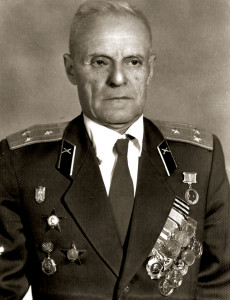SAY ‘I CAN’ AND GO AHEAD
 When we say “the generation of war”, we immediately imagine the children who went through the Artsakh liberation war, who took refuge in shelters, whose ears learned the roar of bombs, whose fathers became stone monuments or remained on the roads of obscurity. And even if they returned home victorious and glorious, the war was still engraved in their memory as a beating wound, unrelenting pain. But there is a generation in Armenia that is also a generation of war, the Great Patriotic War. They did not smell gunpowder, but paid for the victory with their carefree childhood and individual deprivation. Professor Frunze Ghazaryan, Doctor of Pedagogical Sciences, is one of them. “My life has two halves, war and peace,” says Frunze Ghazaryan, taking the story of her two-fold life out of the drawers of the past.
When we say “the generation of war”, we immediately imagine the children who went through the Artsakh liberation war, who took refuge in shelters, whose ears learned the roar of bombs, whose fathers became stone monuments or remained on the roads of obscurity. And even if they returned home victorious and glorious, the war was still engraved in their memory as a beating wound, unrelenting pain. But there is a generation in Armenia that is also a generation of war, the Great Patriotic War. They did not smell gunpowder, but paid for the victory with their carefree childhood and individual deprivation. Professor Frunze Ghazaryan, Doctor of Pedagogical Sciences, is one of them. “My life has two halves, war and peace,” says Frunze Ghazaryan, taking the story of her two-fold life out of the drawers of the past.
WAR
My father came on horseback. He was tall and big, his look proud and strong. The horse was big, with black and shiny hair. My father would get off his horse, walk hard, and kick his feet firmly on the ground.
We returned to Armenia from a small town in the Far East. My mother, me and my little brother. My mother worked at a music school, sowed potatoes in the yard, collected wood for the winter, carried water, and told me about my father before going to bed at night. “Your father is from Nakhichevan, from the village of Chanabad. He was very young when his mother died. The family was poor, and the four younger brothers had to work to earn a living. Your father was a shepherd. One day he decides to run away from home and comes to Gyumri.” My mother was telling like it was a fairy tale. Then she said: “Not a single problem can bring a real man to his knees. Your father did well in school. Then he continued his studies at the military college. Today, together with his two brothers, he is heroically defending the homeland.”
I listened to my mother’s story, dreamed of becoming a real man like my father, and waited for him to return. My father came in February 1943. At midnight they knocked on the door, and then my father came in, wearing a military uniform and a hat.
PEACE
My victory came a little late with my father’s return. My two uncles died in the war, and my father returned with new medals on his chest. I was already a grown-up boy and could read my father’s papers on my own and learned that he had graduated from the Tbilisi Military College, first serving in Leninakan and then in the Far East as a battery commander in the 19th Artillery Regiment of the 26th Rifle Division. When the Great Patriotic War broke out, my father was transferred to the same regiment on the North-Western Front and took part in the battles for the defense of Leningrad. In late 1941, he was sent to the North Caucasus military front, where he was the chief of staff of the artillery regiment and deputy commander of the regiment.
… I loved sports. My father was watching me closely. I am grateful to my father for not taking me to the winds of time, not sending me to law school, or forcing me to become a doctor. He allowed me to enroll in the Institute of Physical Culture and follow in the footsteps of my dream. I was one of the best students at the institute.
…. My father died in 1982. The biography of the Armenian soldier, who started as a shepherd in Chanabad, Nakhichevan and went through the flames of the Patriotic War and reached the rank of colonel ended, leaving his great advice to the living.
“Say ‘I can’ and go ahead.
By GAYANE POGHOSYAN
Category: #18 (1338) 6.05.2020 - 12.05.2020, Destinies










